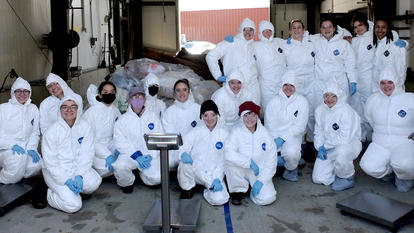Wellesley Introduces Transcript Credit for Summer 2017 Internships

Real-world experience. Job skills. Career perspective. Networking opportunities. Now Wellesley students can add another benefit to the list of those associated with internships: transcript credit.
Wellesley students engage in hundreds of internships every year in a variety of fields, including scientific research, finance, journalism, arts, education, and health care. Wellesley faculty are frequently involved in students’ independent study associated with those internships; they recognized the need to connect them more closely to academic work and, more specifically, transcript credit.
In the fall of 2015, the Committee on Curriculum and Academic Policy (CCAP) approached Academic Council about the need to develop course credit policies regarding internships. In the year that followed, CCAP collaborated with Career Education at Wellesley to create guidelines, and the faculty voted to approve the new policy. Beginning this summer, the College will offer 0.5 nonacademic credit for qualifying internships.
As Christine Cruzvergara, associate provost and executive director for Career Education at Wellesley, explained to the community in an email: “Although the credit is neither required nor degree-bearing, Wellesley believes internships and other forms of experiential learning are an important complement to academics and should be acknowledged on official student records.”
Even before registration, several students who had received word of the opportunity to earn credit contacted Rocío Tisdell ’07, program director for internships, to ask for letters they could send to employers explaining the new option. Tisdell considers that encouraging because, she said, “One of the reasons we wanted to offer credit was because we knew it would expand access for students to internships that require it.”
Accessibility is key: Many employers require that interns receive credit for their work, which previously placed Wellesley candidates at a disadvantage with those companies. International students faced additional constraints, because in the absence of credit, summer internships used student visa time intended for postgraduate work.
A plus for Wellesley students is that the College does not assess tuition or fees for credit earned during summer internships, unlike most of its peer institutions that offer internship credits.
The new internship policies also facilitate communication between Career Education and the businesses and organizations with which students work, helping to ensure that the organization is accountable for the student’s educational experience. Previously, students whose internships were not funded through Wellesley may not have even spoken with Career Education or other departments on campus about them—a missed opportunity both for that student, and for future students for whom that internship may have opened a door.
Another benefit to the new credit guidelines is that a student’s college career mentor, based in Career Education, can track how the experience is contributing to her professional development and provide support in managing difficulties she might encounter during her work. Environmental studies major Nisreen Abo-Sido ’18 knows how important that kind of connection can be. Last summer, she interned at the Asian Rural Institute (ARI) in Japan, where she lived and worked on a farm alongside a diverse community of rural leaders from Asia and Africa who were training in sustainable agriculture and servant leadership. “When I first returned to campus after my summer at ARI, I had a debriefing session with my Career Education mentor, Scott Mannion,” she said. “It was truly invaluable to sit with him and to discuss a lot of the highlights and takeaways of my summer. Together, we assessed how the different experiences and challenges I faced could potentially translate into a career for me, based on my interests.”
To be eligible for credit, an internship must occur over the summer, consist of at least 350 hours of full-time supervised work, and connect to the student’s academic studies. That connection can be to her classroom experience or to future research or study, allowing her to explore her interests. Students considering applying for credit should review the guidelines and process here. The final deadline to register is May 4 at 11:59 pm.



